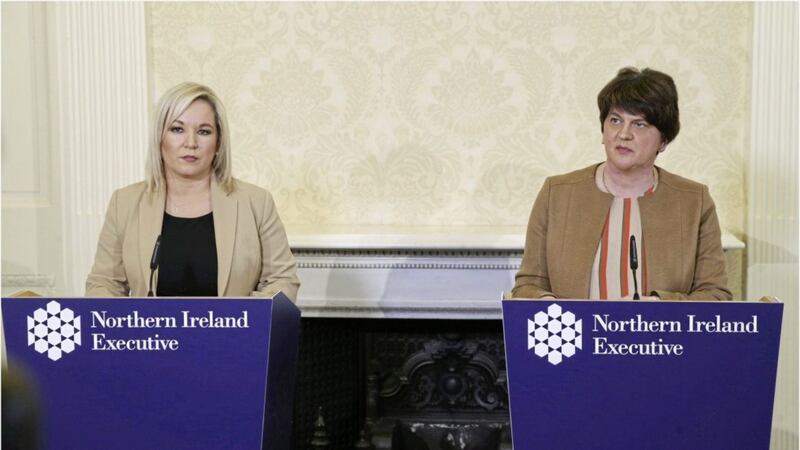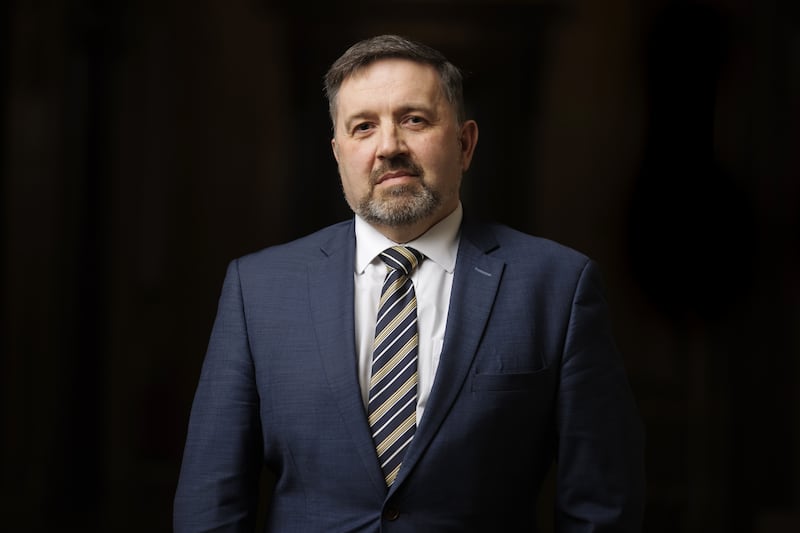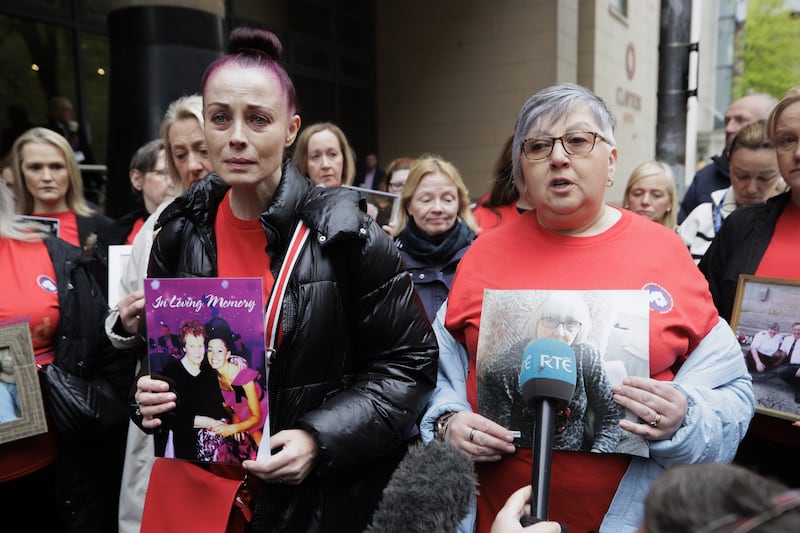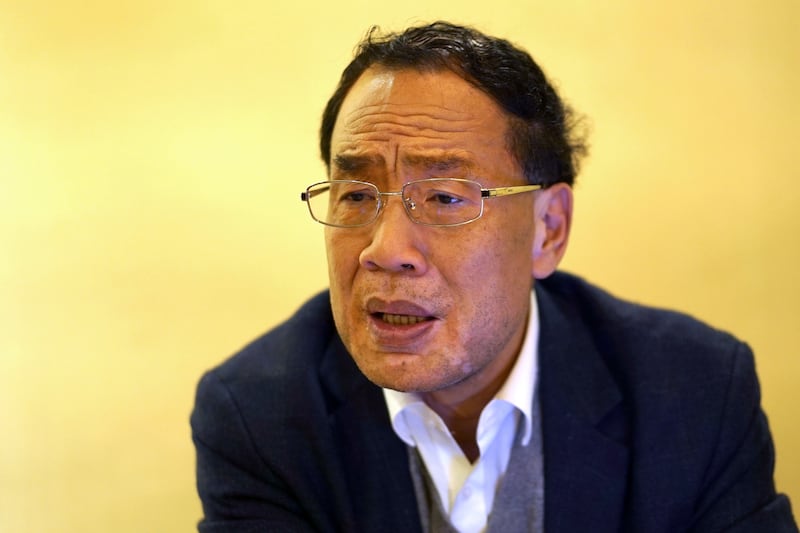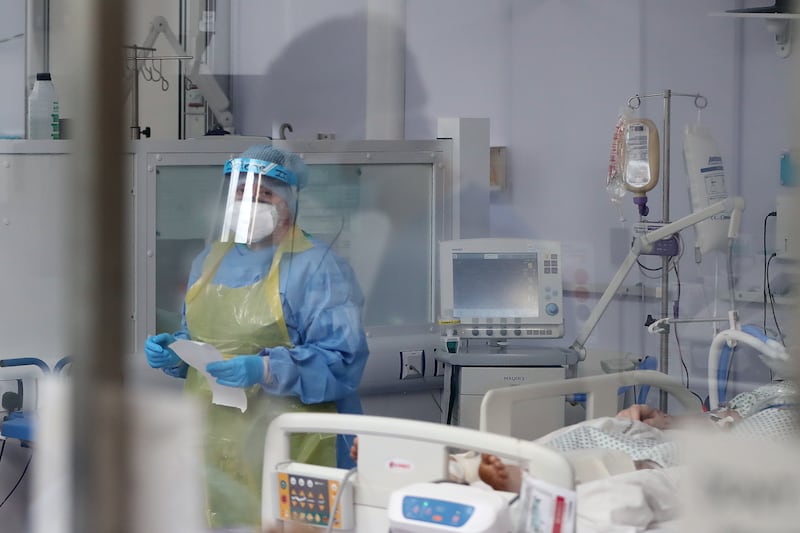Frontline doctors and nurses are frightened by a lack of personal protective equipment, the deputy first minister has told an ad hoc committee of Assembly members at Stormont today.
Michelle O'Neill said good progress is being made in acquiring more equipment (PPE) for medical staff and officials are "working night and day" to procure it.
An order of 5.5 million items of clothing began arriving in Belfast yesterday and will be distributed to the individual health trusts.
[ Read more: Coronavirus: Co-operation agreement between north and Republic signedOpens in new window ]
Appearing before an ad hoc committee of Assembly members today, Mrs O'Neill said she was well aware of healthcare workers' concerns.
"You have told me you are frightened," she said.
"You have told me you are worried about being able to do your job safely. You have told me that you are worried for your families.
"We see you, we hear you, and we are working night and day to make sure you get the protection that you deserve."
She said good progress is being made in securing more personal protective equipment and this remains a top priority for the Executive.
First Minister Arlene Foster, who also appeared before the same committee, said some healthcare workers could suffer post-traumatic stress disorder following their experiences, and ministers had already begun considering their response.
"There will be mental health issues, not least for our frontline staff, who will have to see things that they probably would never want to see."
She added that ministers did not condone asking the elderly to sign do not resuscitate notices, as the NHS juggles difficult ethical issues about who to ventilate.
"That is wrong and should not be happening," she said.
The first minister added: "People are dying alone, never mind having the wake for comfort for the family.
"It is a hugely difficult time for everyone.
"The grieving process has been very badly interrupted."
Memorandum of understanding signed between north and south of Ireland
It emerged last week that prospects for a joint order of kit from China placed with the Republic have fallen through.
A formal memorandum of understanding has been devised by the health ministers north and south of the Irish border.
Mrs O'Neill added: "While we have two jurisdictions, we are one island and this means it's sensible that we have common action to combat this deadly virus.
"The Covid-19 pandemic does not respect borders, so there must be a common approach to action in both jurisdictions on this island."
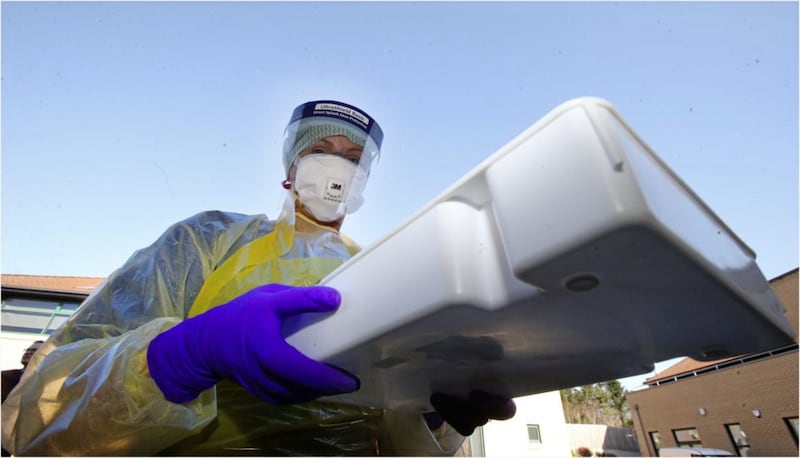
Mrs Foster said the PPE which arrived yesterday is "only the start", and will be distributed to the trusts "who will then filter it down to everyone else within their remit which includes the independent sector and includes domiciliary care workers".
She added that in response to concerns about how the trusts are distributing PPE, health minister Robin Swann is putting in an audit team to "look at the trusts as to how they are distributing that".
Ms O'Neill said it was "hard to fathom" why healthcare staff on the front line were not able to access PPE when stock was available in Northern Ireland.
Auditors to investigate PPE distribution issues
She welcomed a move by Mr Swann to commission independent auditors to investigate the distribution issues.
"I think that should go some way to giving assurances that actually staff know who they can talk to or know where they can go to whenever they are not getting the protection which they feel that they need," she said.
"So I think that will be a significant development in terms of giving the staff the assurances that they need."
Mrs Foster said she understood frustration that not enough healthcare staff had been tested for coronavirus.
"We will continue to expand the testing of healthcare staff as quickly as possible," she said.
"We fully understand the frustration that more staff have not yet been tested, both in the healthcare sector and across other sectors.
"We understand that people are concerned about potentially unknowingly passing on the virus to their loved ones, or those they are looking after.
"And we appreciate that people with Covid-like symptoms are frustrated at having to self-isolate while their colleagues are under pressure, when the results of a test may allow them to get back to work."
She said difficulties in scaling up testing are not due to a lack of effort or will.
"There are significant challenges including laboratory and staffing capacity and the unprecedented levels of global demand for testing reagents and swabs."
Ms O'Neill said a rollout of the executive's testing strategy will see other frontline workers - such as emergency responders, police and prison service staff - being tested.
She said there was also a need to increase testing in community care settings and residential homes.
Ms O'Neill said restrictions on movement had to be accompanied by three key components: testing, isolating and contact tracing.
She said "a lot of progress" had been made on increasing testing in recent days and highlighted the need to establish facilities across Northern Ireland.
Chief Medical Officer Michael McBride
Chief medical officer Michael McBride said there are early signs that social distancing is working in Northern Ireland, and urged the public to continue.
"I can indicate to you today that there are emerging signs that these measures are making a difference in Northern Ireland and your actions are and will continue to save lives," he said.
"I say this tentatively at this point, we will update and share our reasonable worst-case scenario modelling publicly when that is finalised.
"But complacency at this time remains our greatest challenge. If we relax those measures we will see again further increases in admissions of patients with Covid-19, further people getting sick and requiring admission to our intensive care unit and potentially overwhelming our health service."
Health Minister Robin Swann
Mr Swann told the briefing he is confident that staff have access to the right PPE and emphasised that he would not allow or tolerate health workers being put in danger as a result of inadequate PPE.
"We do have sufficient PPE supply for the current demand and I and my staff working along with the Department of Finance are working hard to secure more supplies for any future demand or second surge later in the year," he said.
"We must never become complacent so I would much prefer to come out the other side of this pandemic with far too much PPE remaining in stock than not enough."
Mr Swann said the number of mechanical ventilators had increased to 197, with more on order.
"I want to reassure all those listening, as things currently stand there is sufficient capacity of equipment and oxygen to provide critical care for those who need it," he said.
"But because the worst of this virus is yet to come we must remain vigilant, that is why we have additional ventilators on order to meet our estimated clinical care need."
He added that yesterday alone there were a further 96 Covid-19 related hospital admissions, and today there are 55 Covid-19 related patients in critical care.
Mr Swann also told the committee that coronavirus cases had been reported in 20 care homes in Northern Ireland.
He said those incidents were being managed by the Public Health Agency (PHA) and the Regulation and Quality Improvement Authority (RQIA).
The minister said: "If anyone needs to be moved into hospital that is being done, there is no time lag or delay."
Mr Swann also revealed that the workforce appeal had led to 15,895 expressions of interest, with 937 formal applications.
"230 applicants are already either appointed or pending appointment and many others will follow," he said.
Pressed on signs that social distancing may be starting to work, Mr Swann said: "The importance of social distancing we cannot stress enough.
"We are only at the start of the potential peak that we've been looking at from our worst-case scenario, these measures do seem to be working but they have to be maintained.
"Complacency can be our biggest enemy at this minute in time because if people don't see the direct effect it is having today, they may think their actions aren't playing a part. They do, because your actions today will affect where our health service is in two weeks' time.
"You will see, especially coming into the Easter holidays, an increased presence of the Police Service of Northern Ireland on our roads actually making sure that anybody who is taking a journey outside the home is doing so because of essential purposes.
"There shouldn't be a need for putting police on the roads to make sure your journey is essential, people should be responsible enough to have that in their own head."
Folks the government have asked that everyone stay at home and only have absolutely necessary travel. Driving to your favourite beauty spot for daily exercise flaunts current guidelines. Please exercise near home and observe the rules please.#KeepingPeopleSafe #BallycastleNPT pic.twitter.com/GiZd0bL2pB
— Police Causeway Coast and Glens (@PSNICCGDistrict) April 7, 2020
Dr McBride added: "There are some encouraging signs, early signs that we're experiencing reduced levels of transmissions, that the key thing we are trying to achieve is to reduce the reproductive numbers.
"We have some emerging trends that that's the case but that's been hard achieved, that has been achieved by the public in Northern Ireland following the advice and doing the right thing.
"This virus hasn't gone away, it's not going away any time soon. If we were to relax those measures at this time this virus would come back and we would end up being overwhelmed with the impact that it would have."
Dr McBride said evidence on the infection rate, hospital admissions and numbers in intensive care were giving grounds for optimism.
"There are some encouraging signs," he said.
The senior medic said data suggested the reproduction rate of the disease had fallen from around 2.5/2.8 per person infected to below one.
"If that's the case, that's good news," he said.
"There is no doubt that the measures that we put in place are beginning to have an impact. Complacency is our greatest enemy at this time."
Robin Swann on exit strategy
Asked about a future exit strategy, Mr Swann said more restrictions could potentially be added.
"This isn't going to go away at the end of the restrictions so when we look at the restrictions in two or three weeks' time, it may be we're extending that period, we may actually be putting in more restrictions," he said.
"So to send out the message here today that three weeks' time, this'll all be fine, Covid-19 has left Northern Ireland, that message is wrong.
"What we have to get into people's heads and minds is Covid-19 and the coronavirus is in Northern Ireland and across the world for a very long time so these measures may have to be ramped up and they may have to be scaled back at different points as we see how this virus progresses across Northern Ireland."
Dr McBride said it was too early to talk about an exit strategy from social distancing.
"I'd be happy to talk about an exit strategy when we have effective treatments and when we have a vaccine - we're not in that place at this point in time," he said.
"We are far, far too early to even begin contemplating... stepping back or stepping away from these measures at this point in time, because this virus is out there and it would just come straight back at us."
Agriculture Minister Edwin Poots
Stormont's agriculture minister Edwin Poots said the farming industry required official help.
"The UK Government will need to step up and provide the necessary support.
"I am monitoring the situation locally to see what can be done and working with ministerial colleagues."
He said supermarkets needed to back local farmers and buy their "excellent" produce.
